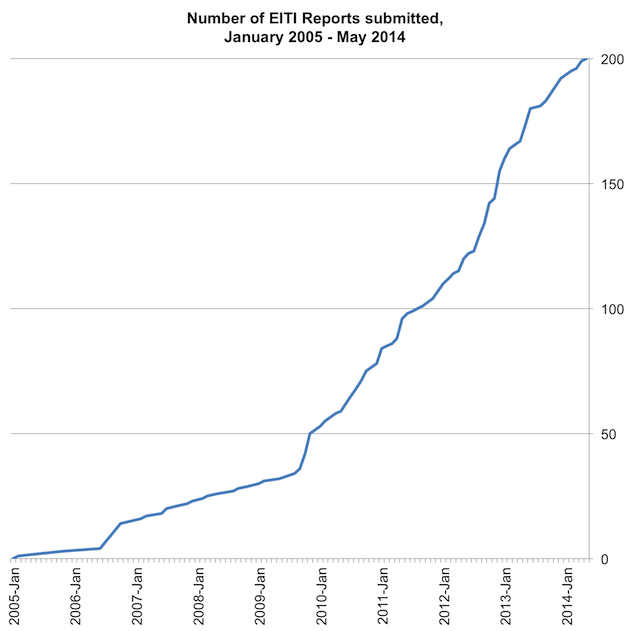
Many EITI countries are undergoing significant resource booms. Others are being hit by declining commodity prices. Meanwhile, another boom is quietly taking shape: that of resource transparency.
While the Indonesia’s account on resource revenues will be scrutinised as much as any other EITI Report, it being the 200th report allows us to take stock of the development in reporting since the first EITI Report was submitted in February 2005 by Azerbaijan.

In the past eight and a half years, 35 countries have disclosed – in 200 reports – over 1.2 trillion US$ worth of revenues from oil, gas and mining.
The move to increasing transparency in the governance of natural resources is gaining momentum, as can be seen in the steep graph above.
In the first four years (2005-2009) 50 reports were published, and in the next four and a half, 150 more followed. 36 reports were publicised in 2013 alone.
Publishing revenues is the first step to seeing results for those living in the countries blessed with resource wealth. Doing this can be a considerable feat.
Take Indonesia. The country has 245 million people living in 497 districts, across 13,000 islands and 750 spoken languages. The decentralised nature of Indonesia’s physical and political landscape poses a challenge to record keeping and coordination between the multiple government entities.
Despite the long and complex process of documenting revenues, Indonesia has gone further than many in company reporting. It was the second EITI country (after East Timor) to demand that the over 70 companies active in resource extraction give a detailed account of payments made to the government on a project basis as opposed to providing an aggregate number for all their activities in Indonesia. This information allows the decentralised governments to better track their income. Citizens, in turn, learn on how much revenue is generated in their region.
Every country has its own challenges, but progress is being made on many fronts. See our online Progress Report, launched this month, to learn how the EITI is making impact – some places without much fanfare – in a growing number of countries: http://progrep.eiti.org/2014/
Contenido relacionado

Talking reform: How Zambia can benefit from beneficial ownership transparency


Looking back, moving forward: Taking action for accountability in natural resource governance


